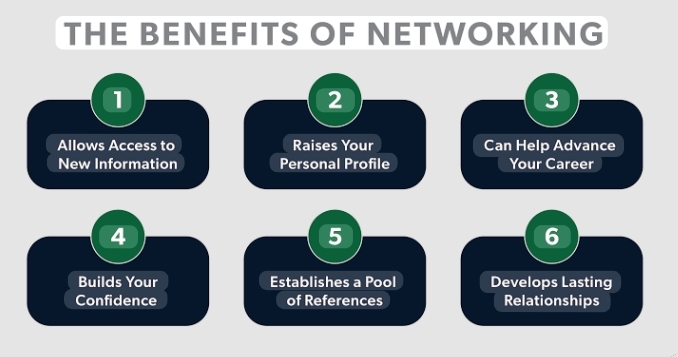
The Importance of Networking
In today’s interconnected world, networking has become an indispensable tool for personal and professional growth. It transcends industries, roles, and geographies, serving as a bridge to opportunities, collaborations, and lifelong learning. Whether you’re an entrepreneur, a job seeker, or a professional aiming to advance in your career, networking is the key to unlocking potential that might otherwise remain hidden.
Defining Networking
Networking is the process of establishing and nurturing mutually beneficial relationships with individuals who can provide support, knowledge, advice, or connections. It is not just about meeting people but also about building meaningful relationships that are based on trust, respect, and shared interests.
The Benefits of Networking
- 1. Access to Opportunities Networking often opens doors to opportunities that might not be publicly advertised. Many job openings, business partnerships, or collaborative projects are filled through referrals and personal connections.
- 2. Knowledge Sharing Networking provides access to a wealth of information and expertise. Conversations with others can offer fresh perspectives, innovative ideas, and valuable insights into industry trends.
- 3. Career Advancement Building a strong professional network can enhance career prospects. Mentors, peers, and industry leaders within your network can guide you, recommend you for roles, and even advocate for your abilities.
- 4. Building Confidence Regularly engaging with professionals in your field can improve your communication skills and boost self-confidence. It’s an opportunity to practice articulating your ideas and presenting yourself effectively.
- 5. Support System Networking also serves as a support system. During challenging times, a strong network can provide advice, encouragement, and resources to help you navigate difficulties.
Types of Networking
- 1. Professional Networking This involves connecting with individuals in your industry or related fields. Platforms like LinkedIn, industry conferences, and seminars are ideal for professional networking.
- 2. Social Networking Social networks like Facebook, Instagram, and Twitter, while primarily for personal connections, can also serve professional purposes when used strategically.
- 3. Strategic Networking Strategic networking focuses on creating relationships that align with long-term career or business goals. It often involves targeting specific individuals or groups who can influence or support your objectives.
- 4. In-Person Networking Traditional face-to-face networking remains a powerful way to build relationships. It includes attending events, meetups, and gatherings to connect with like-minded individuals.
- 5. Online Networking With the rise of digital platforms, online networking has become increasingly significant. From LinkedIn connections to participating in online forums, digital tools have expanded the reach and scope of networking.
Strategies for Effective Networking
- 1. Set Clear Goals Understand why you are networking. Are you looking for a mentor, a job, or collaboration opportunities? Clear goals help you focus your efforts.
- 2. Be Authentic Authenticity builds trust. Approach networking with genuine interest in others, rather than with a transactional mindset.
- 3. Leverage Online Tools Platforms like LinkedIn, Meetup, and Eventbrite are excellent resources for finding networking opportunities. Join relevant groups and participate in discussions.
- 4. Attend Events Conferences, workshops, and industry events are great places to meet people in your field. Be prepared with an elevator pitch and business cards.
- 5. Follow Up After meeting someone, follow up with a personalized message or email. This shows your interest in maintaining the connection.
- 6. Give Before You Take Networking is about mutual benefit. Offer help, share resources, or provide valuable information before expecting anything in return.
- 7. Stay Consistent Networking is not a one-time effort. Regularly engage with your contacts to keep relationships alive and meaningful.
Overcoming Networking Challenges
- 1. Fear of Rejection Rejection is a natural part of networking. Focus on the positives and remember that every interaction is a learning experience.
- 2. Time Constraints Effective networking doesn’t require hours of daily effort. Allocate specific times each week to connect with your network.
- 3. Lack of Confidence Practice your communication skills and start with smaller networking events to build confidence.
- 4. Maintaining Relationships Use tools like CRM software or even a simple spreadsheet to keep track of your contacts and follow-ups.
Networking in the Digital Age
The rise of digital platforms has revolutionized the way we network. Virtual events, webinars, and online communities have made it possible to connect with individuals across the globe. Social media platforms offer unprecedented access to thought leaders and industry experts, breaking traditional barriers of geography and status.
However, the principles of effective networking remain unchanged in the digital age. Building genuine relationships, providing value, and staying consistent are just as important online as they are offline.
Networking Success Stories
- 1. Entrepreneurial Ventures Many successful entrepreneurs attribute their breakthroughs to networking. From securing funding to finding co-founders, networking plays a critical role in entrepreneurial success.
- 2. Career Growth Numerous professionals have transitioned to dream jobs through referrals and recommendations from their networks.
- 3. Innovative Collaborations Cross-industry collaborations often arise from networking, leading to innovative products and services that might not have been possible otherwise.
Conclusion
Networking is a cornerstone of success in the modern world. It’s more than just exchanging business cards; it’s about building relationships that empower, inspire, and support. By investing time and effort into networking, you not only enhance your own potential but also contribute to the growth and success of those around you. Whether online or offline, remember that networking is a skill that can be honed over time. The more you engage with others, the more opportunities you create for yourself and your community.
Here’s the draft for the blog on t
he importance of networking. Let me know if you’d like to refine any section or expand on specific points.
Leave a Reply